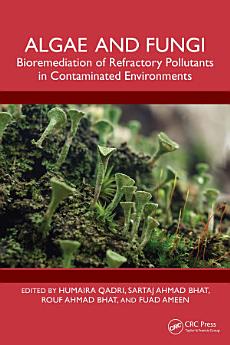Algae and Fungi: Bioremediation of Refractory Pollutants in Contaminated Environments
About this ebook
- Exclusively covers phyco- and myco-remediation of various pollutants
- Reviews dynamics of pollution abatement related to algae as well as fungi
- Covers recovery of the pollutants from polluted ecosystems
- Advocates usage of multiple modes of fungi and algae for detoxification of different compounds
- Discusses restoration of the degraded ecosystems
This book is aimed at researchers and graduate students in environmental engineering, algae and fungi biotechnology, applied microbiology, and phycology.
About the author
Humaira Qadri is heading the Department of Environmental Sciences in Govt. Degree College, Baramulla (Autonomous). She is also the Dean of Research in the college. She has also been actively involved in teaching the postgraduate students of environmental science for the past ten years in Sri Pratap College Campus, Cluster University Srinagar, J&K, India. She has also been heading the Department of Environment and Water Management of Sri Pratap College. A gold medallist at her master’s level, she has bagged a number of awards and certificates of merit. Her specialization is in aquatic ecology and phytoremediation. She has published scores of papers in international journals and has more than 12 books with national and international publishers. She is also the reviewer of various international journals and is the principal investigator of some major projects on phytoremediation. She is guiding a number of research students for PhD programme and has supervised more than 60 master’s dissertations. She also has been on the scientific board of various international conferences and holds life memberships in various international organizations. With a number of national scientific events to her credit, she is an active participant in national and international scientific events and has organized a number of conferences, as well as seminars of national and international repute. She is on the editorial board and the reviewer of various high‐impact journals.
Sartaj Ahmad Bhat is working as JSPS postdoctoral researcher in the River Basin Research Center, Gifu University, Japan. He received his PhD in environmental sciences from Guru Nanak Dev University, Amritsar, India, in 2017. His primary research focuses on the development and evaluation of treatment technologies for solid waste and wastewater from domestic and industrial outlets, as well as organic waste recycling, with a focus on the biological and sustainable treatment by earthworms. He has published more than 50 research papers in peer‐reviewed journals, 3 books, and few book chapters to his credit. He is also an editor, editorial board member, and reviewer of many international reputed journals published by Frontiers, PLoS, De Gruyter, Springer, SAGE, MDPI, Elsevier, Wiley, and Taylor & Francis. Dr. Bhat is a recipient of several prestigious awards such as the JSPS Postdoctoral Fellowship to pursue research at River Basin Research Center, Gifu University, Japan, the Basic Scientific Research Fellowship (BSR JRF, SRF) by the University Grants Commission (UGC), India, the DST‐SERB National Postdoctoral Fellowship (CSIR‐NEERI, Nagpur, India), and Swachhta Saarthi Fellowship by the Govt. of India. He has also received the 2020 Outstanding Reviewer Award from the International Journal of Environmental Research and Public Health, MDPI (Basel, Switzerland), as well as Top Peer Reviewer 2019 in Environment and Ecology by Web of Science, and has more than 600 verified reviews and 60 editor records to his credit.
Rouf Ahmad Bhat has pursued his doctorate at Sher‐e‐Kashmir University of Agricultural Sciences and Technology Kashmir (Division of Environmental Science). Dr. Bhat has been teaching graduate and postgraduate students of environmental sciences for the past three years. He is an author of more than 50 research articles (h‐index 21; i‐index 30; total citation >1200) and 40 book chapters and has published more than 30 books with international publishers (Springer, Elsevier, CRC Press, Taylor & Francis, Apple Academic Press, John Wiley, and IGI Global). He has his specialization in limnology, toxicology, phytochemistry, and phytoremediation. Dr. Bhat has presented and participated in numerous state, national, and international conferences, seminars, workshops, and symposiums. Besides, he has worked as an associate environmental expert in the World Bank‐funded Flood Recovery Project and also as the environmental support staff in the Asian Development Bank (ADB)‐funded development projects. He has received many awards, appreciation, and recognition for his services to the science of water testing, air, and noise analysis. He has served as editorial board member and reviewer of reputed international journals. Dr. Bhat is still writing and experimenting with diverse capacities of plants for use in aquatic pollution remediation.
Fuad Ameen is an Associate Professor and researcher at the Department of Botany and Microbiology, College of Science, King Saud University, Riyadh, Saudi Arabia. He graduated his PhD in biodegradation of urban waste by mangrove fungi from King Saud University, Saudi Arabia. In addition, he has served as a researcher in different places in the field of biotechnology and applied microbiology. After that, he has been involved in many kinds of projects, many of them dealing with new solutions to treat the polluted sites. He has collected and studied microbial strains from arid and marine ecosystems indicating their ability to biodegrade the most common pollutants, and his programme of research on these organisms has taken him to many places and to examples of every major type of terrestrial and marine bio‐ecosystems. He is the author or co‐author of 150 papers and 15 book chapters in peer‐reviewed journals.





